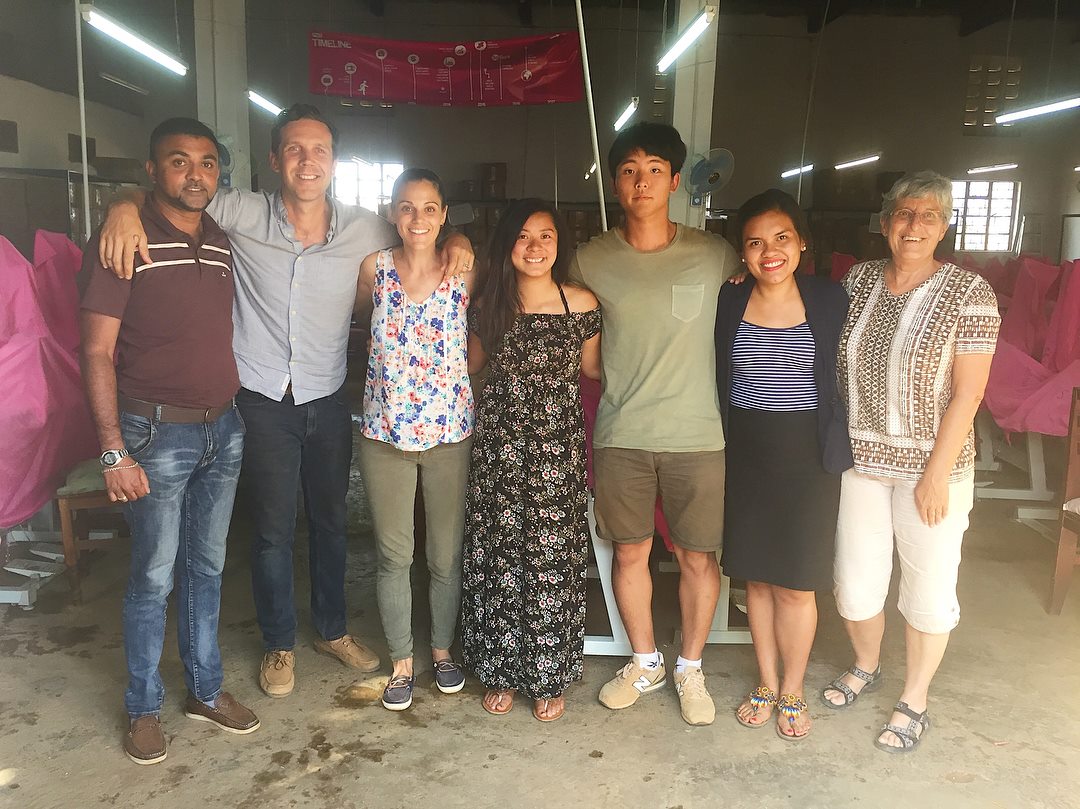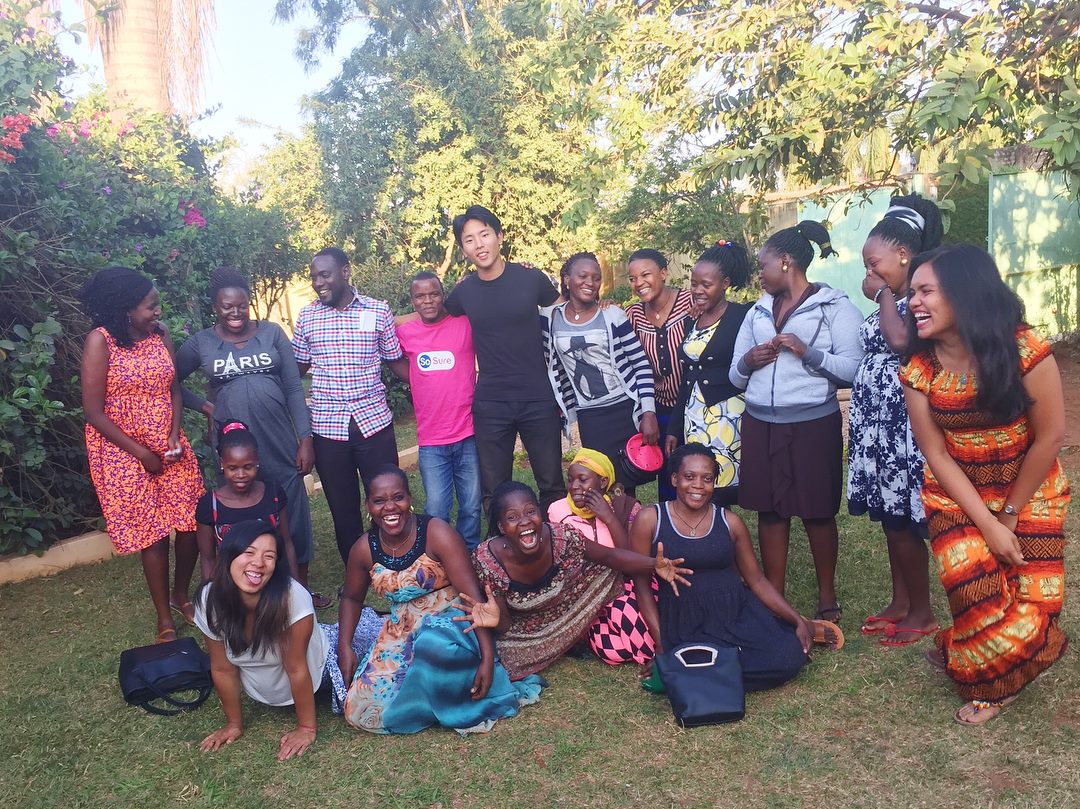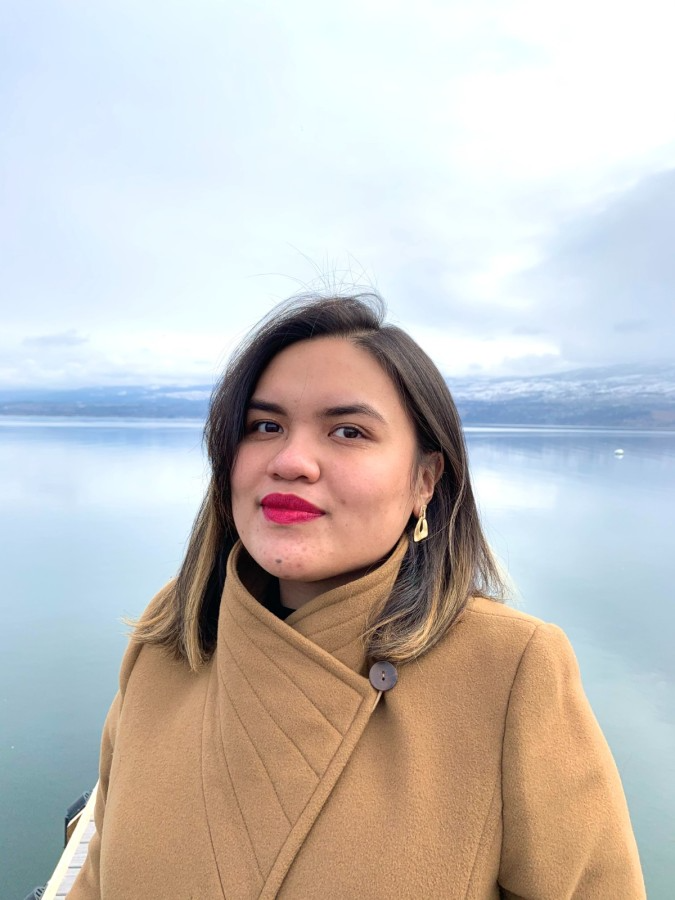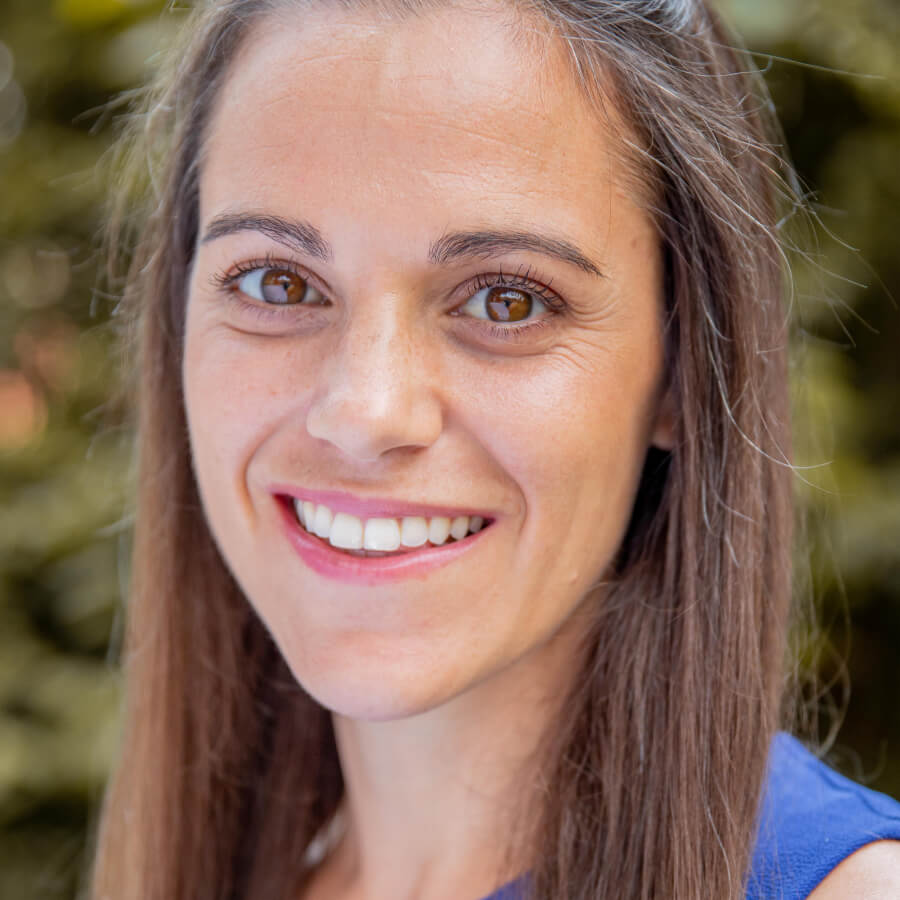The lack of menstrual hygiene products is a substantial roadblock on the journey towards gender equality in many countries. Eliminating that barrier altogether is the mission at AFRIpads. The the social enterprise based in Uganda, Africa has impacted the lives of more than five million women and girls through its sustainable and affordable menstrual kits. Launched in 2010 by a three-person team in the small village of Kitengesa, AFRIpads aims to empower females through business, innovation and opportunity. The company opened a new facility in 2018 in the same community that employs 150 community members, with 83 percent women.
Jeanne Legua, a former UBC undergraduate in economics and international relations, worked in 2018 alongside the AFRIpads team on a research project focused on measuring the economic impact of AFRIpads on its community. Legua found this opportunity as part of the ECON International Service Learning course through UBC’s Office of Regional and International Community Engagement (ORICE).
AFRIpads decided to establish its social enterprise in rural Uganda to offer opportunities for employment, innovation and education. The first project Legua collaborated on – with two other UBC students and AFRIpads staff – was the design of a baseline study and collection of preliminary data on the social and economic impact of the social enterprise in the community. Two years later, Legua was keen to further her collaboration with ORICE and AFRIpads through her studies. She used her Arts undergraduate research project requirement to co-develop a new research topic lifted from the 2018 survey data. In this project, Legua and AFRIpads investigated household determinants that influenced levels of school attendance in the community. With AFRIpads permission and support, Legua published her findings in the Vancouver School of Economics’ IONA Journal of Economics. Legua graduated in 2020 and is now working as the Government and Stakeholder Relations Specialist with United Way British Columbia.
Sophia Grinvalds is AFRIpads co-founder and Director. A graduate of McGill University with a BA in Environmental Science and Medical Anthropology in 2005, Grinvalds and her husband Paul, co-founder and CEO, started AFRIpads in 2010. Here’s what Legua and Grinvalds had to say about the project.
Sophia, why did you want to partner AFRIpads with ORICE on this project?
Our interest ties back to our initial ideas in designing AFRIpads as a social enterprise. Worldwide, we know that women who have access to resources create a ripple effect that makes a huge impact on their personal lives, families and communities. We had engaged with other organizations actively thinking about sustainability through programming, and we saw that a social enterprise model could ensure employment for women and enhance their capacity to invest in the family. Employing women pulls them into the formal economy and provides a secure and predictable source of income, allowing them to plan and make decisions for the benefit of their families and communities. At the time that this idea was emerging, we were living in Kitengesa, a rural area a few hours southwest of Kampala, and wondered what kind of an impact something like this could have on a rural community as opposed to an urban area.
When we began speaking with the team from ORICE UBC about a baseline study, we really wanted to know, did AFRIpads enhance womens’ ability to invest in their families? Is employment with AFRIpads beneficial to women, their families and the community? If so, how? And if not, why not? We wanted to know this both from a quantitative and qualitative perspective, and not only from our anecdotal observations.
This study kicked off when the company was about eight years old. As an entity, we had grown significantly and were excited about what we were seeing. If the findings from the baseline and subsequent follow-ups were positive, it would give us more information to strengthen the case for rural investment and demonstrate an example of how a social enterprise can contribute to breaking the poverty cycle. And, we were curious: Have people been able to purchase land? Build homes? Send their children school and maintain their schooling? What else is happening in the community?
We don’t claim to be responsible for all growth, but we wanted to know how giving women sustainable employment in an environment that values them and their contributions shows up in the ripples of the surrounding area. We hope to continue to show that you can do business and you can do good. So, we needed the baseline survey to see the longer-term vision in action, and working with Jeanne and her colleagues through UBC was a good opportunity for us and for the students.
Jeanne, why did you choose to participate in this program?
I wanted to hone my skill sets in doing economic research in a community setting. International experience was a pleasant bonus! I also value working with, and learning from, local people and partner organizations as I build out my career in community development and public policy. I understand that to be effective in that field – and true to the purpose of systems-level change and advocacy – you have to recognize the value of grassroots perspectives and expertise.
Through the 2018 baseline survey, AFRIpads offered us the chance to deepen our understanding of research methods. My student team members and I are grateful to have been part of this opportunity. The project is intended to be part of a multi-year impact assessment strategy for AFRIpads to know, analyze and act on – and potentially share details about – its socio-economic impact on the local community.
In the initial phase, our team collected baseline survey data from the local rural community where the factory is located, which included designing and testing the survey methodology for this specific context. We know that the mid- and end-line studies will be important for the overall questions that are being asked, but AFRIpads has already used some of the baseline information to work alongside community leaders and national officials in their existing efforts to enhance infrastructure, such as roads and electricity.
Jeanne, what did the project findings reveal?
In the first baseline study, we looked at the topics such as poverty and living conditions, access to clean water, access to health services and land ownership. This first study included 245 families in eight different villages within a two-kilometer radius. AFRIpads plans to conduct a follow-up study in the coming year to analyze the changes from the baseline and consider the implications for their participation in the community.
While there were several takeaways related to household-level socio-economic conditions, one topic of interest was children’s education levels and school attendance. This became the focus for my senior undergraduate research paper in my Economics program. In this paper, I investigated household factors that influenced school attendance at expected pace-for-age. Overall, what emerged was the higher likelihood for boys and younger kids to be afforded the priority to go to school compared to their siblings and older girls when household resources are constrained. This finding underlines the potential impact that organizations like AFRIpads can have in the long term as a key contributor to economic growth in the local economy, with the potential to raise living standards of households generally and women particularly.
UBC student surveyors helping pack AFRIpads products with staff in 2018 (left to right: Kim Woo, Prince George Oleny, Judith Nassaka, Jeanne Legua, George William Sseruwu) (photo: Jeanne Legua)
Jeanne, what were your biggest learnings?
The student team realized early on that you have to learn from each and every community, and understand its unique context before starting a project alongside them. I heard about community-based approaches often in my development economics courses. But it wasn’t until I had this experience that I developed a deeper understanding – and advocacy towards – this school of thought. Before our three-month placement abroad, the International Service Learning program prepared us with pre-departure sessions discussing topics such as power and privilege, historical contexts and the importance of humility in learning. This perspective is a big strength of ORICE, and it helped us to understand from the beginning that the community organizers are the leaders. When I was in Uganda, the importance of genuinely working and learning with our partners, side-by-side – not leading – was underscored. True collaboration makes it all so rewarding.
In the baseline project, the AFRIpads team prioritized getting to know people inside and outside of the organization, and learning about the history and context of the social enterprise. Only then did we collectively dive into discussing methodologies and approaches of the baseline survey.
A lot of people want to make the world a better place, whatever profession they may have. I believe wholeheartedly that to make ripples of change for the better, it helps to be exposed to multiple worldviews and be held accountable for our values and actions; it makes you more well-rounded as a professional and person in this space. This learning still affects – and positively influences – my professional career today.
Sophia, what does AFRIpads learn from collaborations like this?
When you run a social enterprise you are constantly making decisions about how to spend money to amplify the desired metrics. Even when a social enterprise is profitable, there are decisions to be made about business and social impacts – and which to prioritize when. We created this opportunity collaboratively, and we discussed what kind of partnership would be mutually beneficial.
Partnerships with academic institutions have allowed for a contribution to our knowledge base that we otherwise would not have undertaken. The focus of AFRIpads is on menstrual health, and we aim to address this through products, education and evidence. We have collaborated with various academic institutions – University of Oxford, LSHTM, WEDC Loughborough University and UBC – by opening our doors, providing information about our learnings, and access to our work. It is a chance for all of us to learn together, and contribute to the evidence base for menstrual health and social business.

Left to right: Gihan De Silva (Factory Manager), Paul Grinvalds, Sophia Grinvalds (co-Founders), Kim Woo, Leo Soh & Jeanne Legua (2018 UBC student surveyors), Dorothy Maynard (Director of Operations) after the baseline survey result presentation (photo: Jeanne Legua)
Jeanne, how did you find the experience of living within the community?
It was both an academically rewarding and spiritually fulfilling journey that was a highlight of my undergraduate career. Apart from the internship’s academic takeaways, I also had many learnings to reflect on from my experience living in the community. As a Canadian immigrant born and raised in a developing country (the Philippines), I had certain assumptions about what the experience would be like – such as how Ugandans might see me as Filipino-Canadian and experiencing another different culture. Those are things you can’t exactly anticipate in advance and experience helps to shine a light on assumptions we don’t even know we are making. The whole experience was quite immersive, and I learned so much about myself in the process.
Sophia, what is running a social enterprise in a rural community such as Kitengesa like?
Our location choice was a key pillar of our social business model, and 12 years later, it continues to be a central driver of our social impact. AFRIpads is proving that it’s possible to run a profitable social business that manufactures world-class, widely exported products and creates much needed industry and employment, all in a rural village in Uganda. By doing so, we hope to inspire other social entrepreneurs and investors to make similar investments in sustainable rural development and advancement. To truly “make the case” for this, we take a partnership approach with those who work with us, the community and partners such as academic institutions.
How can we best work together to make a case for social enterprise investment, or rural investment? Is there a case to be made? Is it as transformative as we hope it will be? How is it (or not), and how do we measure it? There continues to be a lot to prove and act on with regard to menstrual health and gender equality. We hope that studies, such as the one with Jeanne and her colleagues, will help us to understand the positive and negative impacts of our work and the choices that we are making, including working in a rural community.

UBC student surveyors in 2018 with AFRIpads Masaka factory location supervisors (photo: Jeanne Legua)
Jeanne, what should UBC students know about global learning programs such as this?
Experiences like this can teach you so much more than you might imagine. For example, variations in work styles and culture: there’s a big learning curve! Part of what I came to learn is that one style isn’t better than another; there are lessons everywhere. In this project, I learned that journey and the process are just as important as an outcome – and in fact, the deadline was met with far less stress when I accepted that. I think collaborative projects can result in good outcomes when we adopt a community-centered or holistic approach to work. I genuinely believe a lot of good comes out of approaching any context, old or new, in a mind-space of curiosity and learning.
UBC is made up of quite a diverse group of students. I feel that opening up these types of experiences for students, regardless of their majors, can benefit a lot of community-minded individuals looking for unique ways to learn and engage. Whenever I speak about my research placement in Uganda, a lot of my friends ask me how I found out about this program – it is such a hidden gem in the UBC community that we could promote more widely. I hope that many will be able to seize this unique international engagement opportunity.
Sophia, do you have any advice for students wanting to get involved in a global learning program?
As an undergraduate student, I was primarily interested in development and public health. I was fortunate to come to East Africa through an excellent program facilitated by McGill University for four months in 2003. This was very important because it gave an opportunity to merge theoretical underpinnings and academia with some initial experiential understanding. It firmed up my conviction that I wanted to focus my career on the intersection of sustainability and the environment.
Ultimately, years later, when we started discussing the idea of AFRIpads, this is when the lightbulb sparked and everything came together with my public health interests. I highly recommend that students engage in experiential education – but be selective with the program and engage with the intentions to listen and think, far more than you will act. This experience may be a seed that will grow later on. For Paul (co-founder) and me, AFRIpads came many years after that experiential program in my undergrad. We returned to Uganda for the purpose of learning and connecting, we committed to spending an extended amount of time and we didn’t have a plan other than to learn and be helpful to existing community initiatives. AFRIpads only came into being once we had been immersed in the community long enough and built relationships that allowed for conversations to occur that led to our understanding of the impacts on girls and women when menstrual health hygiene is lacking.
Find out more about ORICE’s community and engagement programs: get involved with the next round of the community impact assessment with AFRIpads in summer 2023 through ECON 364B. Learn more and apply.
Find out more about UBC’s Economics and International Relations programs.
Find out more about AFRIpads.


